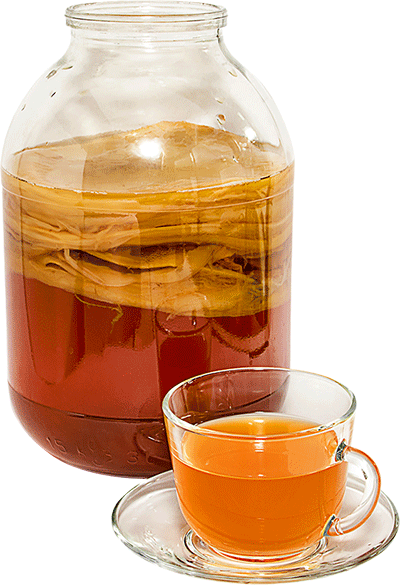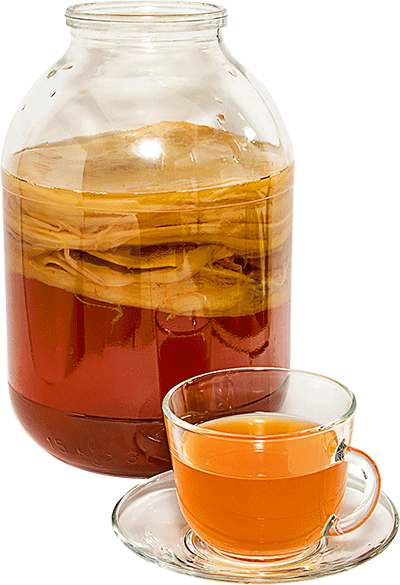
Kombucha, a fermented tea beverage packed with live bacteria, has been making waves as the latest go-to health beverage. Made from sweetened tea and a specific culture known as a ‘symbiotic culture of bacteria and yeasts’ (or SCOBY), interest in the fermented drink has grown significantly since it first appeared on the market.
Thought to have originated in Asia, with the first recorded evidence believed to date back to the Qin Dynasty in 220 BC, the so-called ‘tea of immortality’ already has a rich history in China, Japan, Russia and Eastern Europe, where drinkers have been drawn to the ‘gut-friendly’ beverage for centuries. But recently, kombucha has enjoyed a surge of popularity in western markets thanks to growing interest in ‘better-for-you’ beverages that offer functional benefits.
With its myriad of beneficial health claims, kombucha has been well-positioned to target this budding market. According to a report by Zion Market Research, the global kombucha market was valued at around $1062.0m in 2016. This is expected to reach approximately $2457.0bn by 2022, growing at a compound annual growth rate of roughly 25.0% between 2017 and 2022. Already a fan favourite among health-conscious consumers in the US, demand for the ‘gut-friendly’ drink has grown significantly over the past decade, and brands across the Atlantic are keen to replicate its success in the UK.

What is Kombucha?
The age-old fermented beverage is relatively simple to make. In fact, it’s so simple that home-brewing kombucha has become a popular option for hardcore ‘booch’ fans, much in the same way that craft beer brewing has in recent years.
While the specific process may be different for individual brands, at its most basic, Kombucha is comprised of sugar, cold filtered water, black or green tea and a symbiotic culture of bacteria and yeast (or SCOBY to booch aficionados).
The SCOBY is responsible for several of the nicknames kombucha has acquired over the years, including kombucha mushroom and kombucha mother. If you are unfamiliar with the concept, the SCOBY is the living home for all the bacteria and yeast that gives the tea its tangy, effervescent taste.
It may look very unappealing, more akin to an alien or a jellyfish than anything you would commonly associate with a beverage, but this rubbery raft is an essential part of the fermentation process. Not only does it harbour the ‘gut-friendly’ bacteria associated with the drink, it also acts as a seal, protecting the fermenting kombucha from undesirable bacteria in the air.
“The global kombucha market was valued at around $1062.0m in 2016”
To make the drink, the sugar and tea is immersed in boiled water, and then left to cool before the SCOBY is added. The mixture is then covered and left to ferment for up to a week after which extra sugar is added and the kombucha is poured into an airtight container to rest for a few more days. At this point, flavourings can be added. The longer the mixture is left, the fizzier it will become.
Whether or not it is necessary to add flavourings to kombucha is up for debate. The taste of traditional kombucha is said to sit somewhere along the spectrum of cider, beer and wine. For some brands staying as close to the original flavour profiles and letting the tea do the talking is an important feature of brewing kombucha, but the sweet and sour taste isn’t for everyone.
Companies have been expanding the number of taste offerings with various exotic flavours combining fruits, flowers, herbs and spices in order to entice a wider range of consumers. Consequently, the flavoured segment is projected to grow at the highest CAGR from 2016 to 2024 according to Grand View Research.
Benefits of Kombucha:
Probiotics and Antioxidants
Kombucha has been touted as a miracle elixir by advocates, however while many of the larger curative claims about the fermented beverage lack substantial scientific research to support the buzz, health-conscious fans say that the abundance of probiotics and antioxidants that appear in the beverages can aid digestion and promote gut health.
Gut health has received notable attention in recent years. Our bodies are inhabited by a diverse and complex ecosystem comprised of roughly 100 trillion bacterial cells, dubbed the ‘microbiome’. The highest concentration of this microflora is found in the gut, where it plays a vital role in breaking down food and toxins as they pass through the digestive tract.
“The SCOBY is the living home for all the bacteria and yeast”
Fermented foods, such as kombucha, are rich in probiotics and ‘friendly’ gut bacteria that are claimed to influence our overall health in a variety of surprising ways, from the ability to resist infection to weight loss. Moreover, the fermented tea is full of antioxidants, which are claimed to boost heart and liver health, and B vitamins, which provide support for the body’s metabolic functions including overall energy, heart health, healthy hair, skin and nails.
Research into the benefits of kombucha in humans is limited; however, studies have found evidence to support some of the smaller health claims. In 2017, researches at the University of California, Los Angeles (UCLA) published a study in the European Journal of Nutrition which found that polyphenols in decaffeinated green and black tea altered gut microbiome profiles in a way that inhibited weight gain among diet-induced obese mice.
“We’re learning more and more about the importance of the ‘friendly’ bacteria and other microbes that live in our gut. They’re thought to influence our immunity, mood and weight, as well as our digestion of course,” says nutritionist Cassandra Barns. “Traditional fermented foods such as kombucha can be a key way to maintain the healthy bacteria in our gut – in fact, some research suggests that they’re much more effective than taking probiotic supplements for this purpose.”
Fermented beverages in the UK:
the wellbeing resurgence
Kombucha is currently enjoying a resurgence in the UK, thanks in part to a wider change in attitude towards health and wellbeing. Consumers are paying closer attention to how their beverage choices impact their body and consequently, many shoppers now actively opt for products they believe to be beneficial.
British brands have been keen to tap into the growing popularity of the fermented drink. In London, dedicated kombucha bars have begun to pop up around the city. One of the first kombucha tap rooms in Europe, Jarr Kombucha, is the brainchild of one of the first champions of kombucha in the UK, Adam Vanni. Rather fittingly, Vanni hails from California where the lightly-sparking fermented tea has become a staple feature on store shelves. An offshoot of Crate Brewery in East London, Jarr offers neat kombucha and cocktails, which blend original, ginger and passion fruit flavour varieties with locally made spirits, juices and botanicals.
In North Yorkshire, Equinox Kombucha is also working to expand the awareness of the fermented beverage. Founded in 2012, the brand has gone from humble beginnings to stand as one of the market leading kombucha brands in the UK, distributing to health food stores, cafes and bars across Europe.
“Fermented foods, such as kombucha, are rich in probiotics and ‘friendly’ gut bacteria”
“The genesis of the Equinox idea was based on a trip to Thailand,” says Equinox CEO, Daniel Spayne. “A couple, Robert and Daphne, went backpacking around Asia and came across Kombucha in local bars and restaurants. They were inspired and decided to start brewing Kombucha in their kitchen and then went on to sell it in markets. The drink was very popular and we soon moved into a small industrial unit.”
That small industrial unit has since grown into two, from which Equinox now boasts a range of four flavours: original, ginger, raspberry and elderflower and wild berry. The company remains dedicated to its ethos of making a healthier, natural drink that offers a viable delicious alternative to traditional soft drinks on the market. But, introducing an unusual concept into the UK market hasn’t been an easy process for the brand.
“When we first launched Equinox Kombucha, most people in the industry didn't even know what Kombucha was,” says Spayne. “This made finding people willing to stock the product much more difficult. However, these days’ people are willing to listen to the story and give it a try.”
As a rising star in the UK drinks market, the kombucha trend looks set to continue over the coming year. While the eyebrow-raising health claims may lack sufficient evidence to garner support from medical experts, the gut-friendly appeal of functional fermented drinks may be enough to capture the attention of health-conscious consumers in the west, particularly if the demand for beneficial, added-value drinks continues.
Image Courtesy of Shutterstock - By Boiarkina Marina